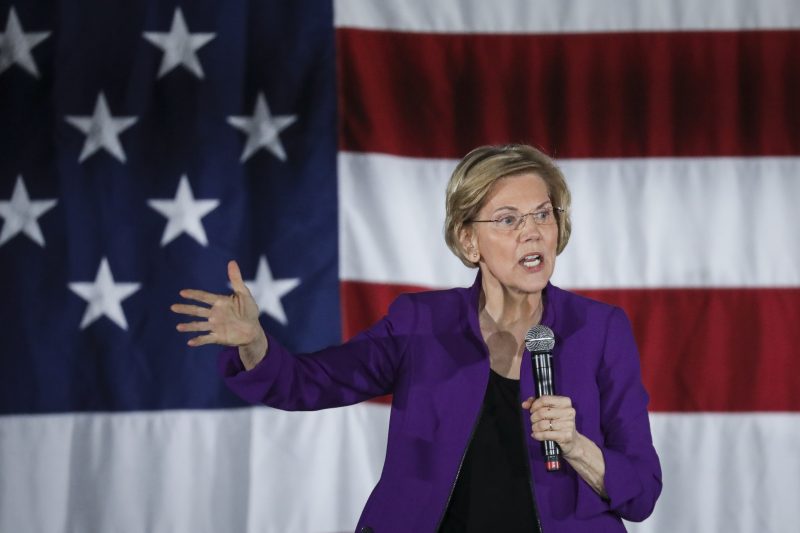Slavery reparations debate resurfaces in White House race
Senator Elizabeth Warren, a candidate for the Democratic presidential nomination, has supported reparations for the descendants of slaves (Drew Angerer)
Washington (AFP) – In January 1865, as the US Civil War was drawing to a close, some freed slaves were promised “40 acres and a mule” to begin new lives.
The audacious experiment was fleeting — repudiated within months by president Andrew Johnson, successor to the assassinated Abraham Lincoln, and the land returned to its former owners.
More than 150 years later, the question of whether the United States should provide compensation to African-Americans for past wrongs is still on the table.
Reparations for centuries of slavery and racial discrimination has emerged as a spirited topic of debate among the slew of candidates seeking to become the 2020 Democratic nominee for president.
Civil rights activist Jesse Jackson, during his failed 1988 White House bid, raised the controversial subject but it has never figured so prominently before in a presidential race.
Barack Obama, America’s first black president, and 2016 Democratic nominee Hillary Clinton did not support compensation for the descendants of slaves.
Among the 2020 Democratic presidential candidates, Senator Elizabeth Warren and Julian Castro, the former mayor of San Antonio, have come out strongly in favor of reparations.
“America was founded on principles of liberty and freedom and on the backs of slave labor,” Warren, a senator from Massachusetts, said recently at a CNN event in Jackson, Mississippi.
“This is a stain on America,” Warren said. “I believe it’s time to start the national, full-blown conversation about reparations in this country.”
Castro, seeking to become the first US president of Hispanic origin, said he backed reparations while acknowledging there is a “tremendous amount of disagreement” on what they should be.
“If, under the Constitution, we compensate people because we take their property, why wouldn’t you compensate people who actually were property?” he said.
– ‘Injustice, cruelty, brutality’ –
Warren has thrown her support behind a bill in the US House of Representatives that would appoint a commission to examine the subject.
The bill, HR 40, calls for a panel “to address the fundamental injustice, cruelty, brutality, and inhumanity of slavery in the United States and the 13 American colonies between 1619 and 1865.”
The commission would “consider a national apology and proposal for reparations for the institution of slavery.”
HR 40 — so named for the unkept “40 acres and a mule” pledge — was first introduced in the House three decades ago and has been resubmitted every year since, but has never reached the floor for a vote.
Senators Kamala Harris and Cory Booker, the two black candidates in the race, have also signaled support for reparations while former Texas congressman Beto O’Rourke has said there should be a “conversation” about the subject.
“We need to study the effects of generations of discrimination and institutional racism and determine what can be done, in terms of intervention, to correct course,” Harris said on National Public Radio.
Marianne Williamson, a self-help author considered a long shot for the nomination, is the only Democratic candidate for the moment advocating direct payments to African-Americans.
Williamson has proposed creating a $200- $500 billion fund to do it — a number that scholars of the subject have ridiculed as far too little. A more reasonable figure, they argue, would run into the trillions of dollars.
Two other Democratic hopefuls — Vermont Senator Bernie Sanders and Minnesota Senator Amy Klobuchar — have supported addressing racial inequality as part of their wider plans to reduce income disparity.
“I think right now our job is to address the crises facing the American people in our communities,” Sanders said on ABC’s “The View.” “And I think there are better ways to do that than just writing out a check.”
– ‘Frightening’ –
Klobuchar said there was a need to “invest in those communities that have been so hurt by racism.”
“That means looking at, for our whole economy, community college, one-year degrees, minimum wage, child care,” she said on NBC’s “Meet the Press.” “It doesn’t have to be a direct pay for each person.”
Blacks are a key voting bloc for Democrats and their support is seen as essential to the candidate running against Republican President Donald Trump next year.
Fifty-two percent of the African-Americans surveyed in a 2015 CNN-Kaiser poll supported cash payments to the descendants of slaves.
But 89 percent of the white Americans polled opposed the idea.
Author Ta-Nehisi Coates, in a seminal 2014 article in The Atlantic called “The Case For Reparations,” said the idea is “frightening” to many Americans “not simply because we might lack the ability to pay.”
“The idea of reparations threatens something much deeper -— America’s heritage, history, and standing in the world,” Coates said.
“But I believe that wrestling publicly with these questions matters as much as — if not more than — the specific answers that might be produced,” he said. “An America that asks what it owes its most vulnerable citizens is improved and humane.”
The United States has handed out reparations in the past including to Japanese-Americans put in internment camps during World War II.
Disclaimer: This story is published from a syndicated feed. Siliconeer does not assume any liability for the above story. Validity of the above story is for 7 Days from original date of publishing. Content copyright AFP.


